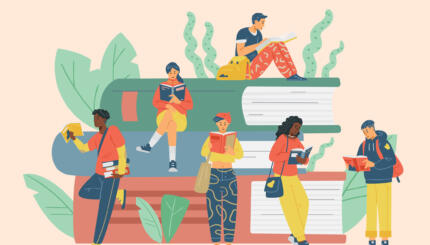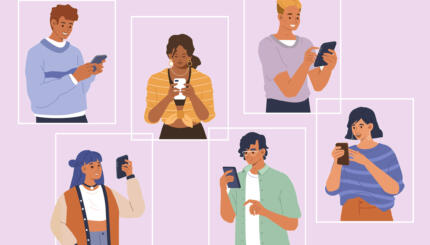One of my favorite traditions around Shavuot is the reading of the Book of Ruth. To me, it always jumps off the pages as one of the most human and moving stories in the Torah. You can read the (short) story here. It is a story about a family that experiences disaster, and the survival of two women from this family, Ruth and Naomi.
People have found many powerful meanings in this story over the years. Rabbi Zeira, one of the early sages, wonders how it fits in the Torah at all. He comments, “This story has neither prohibition nor permission, neither impurity nor purity, for what was it written? To teach us the reward for loving-kindness.” (Ruth Rabbah 2:14). Some see in it a story of queer love, and draw inspiration from the beautiful words of dedication that Ruth offers to Naomi. Others are drawn to a reflection on the power of chosen family. What is most powerful to me is the narrative of interconnectedness and solidarity that I find when I read this story.
Ruth and Naomi are facing a cruel reality: they live in a time and place that tries to deny them agency and power, places them on the very margins of the economic system, and leaves them deeply vulnerable. Naomi is vulnerable as an older woman who has no male relatives or access to means of economic support. Ruth is vulnerable as an immigrant whose access to the protections that apply to Israelites is minimal. Both of them are expected to survive – or not – on the margins, and to go their separate ways: Naomi to glean in the fields and Ruth to her family in Moab until she can find another husband.
But this is not how the story goes. Instead of going it alone and quietly surviving – or not – Ruth and Naomi remain connected, strategize together, and lift one another up. They navigate their way through a system that does not place either of their needs at the center. And when we as their descendants learn about their story, the Torah makes a point to tell us that the child who is born to Ruth and Boaz and adopted by Naomi is the grandfather of King David. This is the Torah’s symbolic way of naming their story as an indispensable part of the redemptive journey of the Jewish people.
The lessons about interconnectedness resonate deeply today. We live in an interlocking system of inequalities that impact us in countless ways. In our work at Keshet, we focus on the ways that LGBTQ people experience inequality because of our genders or sexual orientations. We equip Jewish organizations with the skills and knowledge to build LGBTQ-affirming communities, create spaces in which queer Jewish teens feel valued and take action for LGBTQ rights nationwide. This work is important, and there are very specific and distinct ways in which LGBTQ people navigate and change a world that does not always place our experiences at the center.
This Shavuot, I am reflecting on the ways in which the work we need to do is bound up with the broader mission of equality, safety, and dignity for all people. At this moment, our world and our communities are facing the devastating effects of the COVID-19 pandemic. It is clear that this pandemic is magnifying inequalities that already existed and disproportionately impacting people of color, people with disabilities, LGBTQ people, undocumented people, incarcerated people, and economically marginalized people. This impact is exponential on people who fall into more than one of these categories. At the same time, many of our organizations find themselves struggling financially, working differently, and making decisions in “crisis mode.” Too often those who are most directly impacted by this crisis are also the first to fall off the list of priorities.
As we enter into Shavuot, I find re-reading the story of Ruth to be an important reminder that this is not how it has to be. This story is a reminder that the redemptive narrative of our people – how we make things better one day at a time – by definition includes each of us in all of our complex and overlapping identities. It is a reminder that the ways in which we work for justice are fundamentally interconnected, and require us to learn from and be in solidarity with one another. Some of what that means for us at Keshet is that we are continuing to engage in the internal work for racial equity within our organization and programs. We are working to address disability access as events force us to use new formats for our programs, and helping organizations learn about how LGBTQ people are impacted by this crisis. This work may not be simple, but it is an indispensable part of building a just and fair the world.
As we prepare to enter this holiday, I invite you to read the story of Ruth and Naomi through this lens. Watch for the moments when they learn from one another, lift up one another’s needs, or protect one another. Join me in imagining what this could look like in our work, how we can learn from, and lift one another up as we make this world closer to the way that it should be.
_______________
Rabbi Micah Buck-Yael is Director of Education and Training at Keshet


